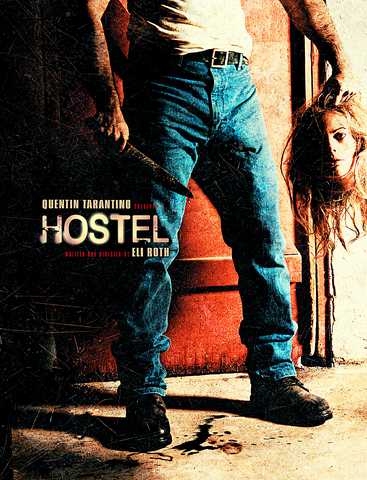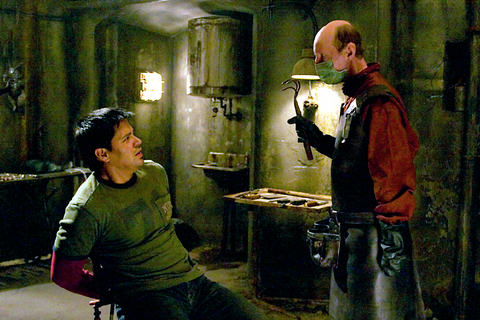A couple of years ago there emerged a moderate frat-boy comedy called EuroTrip, and it had one good gag. A bunch of American teen backpackers in Europe, finding themselves in a godforsaken post-Soviet hellhole and discovering that they are all out of local currency, pool whatever American cash they have on them. It comes to around US$1.13. "What can you get here for that?" ponders one, peering round at the wrecked municipal housing and the rabid dogs scavenging in corners. Cut to: an absurdly lavish private room in something that looks like a 19th-century brothel, with our smirking heroes about to get the best of everything, including champagne and women.
My theory is that the makers of this film saw EuroTrip and thought: hmmmmmm, why don't we remake this as humorless soft-porn horror? And while we're about it, why don't we steal the opening idea from The Beach? The result is a film called Hostel, a title I can't read without remembering William Boyd's remark in Stars and Bars about it being the way Americans pronounce the word "hostile." It has been heavily touted as the last -- or at any rate the latest word -- in ordeal horror, executive produced by no less a person than Quentin Tarantino, but it's actually silly, crass and queasy. And not in a good way.
A couple of American guys and their wacky Icelandic buddy come to sunny Slovakia because they're told the local hot babes will screw anyone from the US of A -- but their quest to get laid ends in some deplorable dungeon with a very unsexy Slovakian bloke cranking up the chainsaw. (Needless to say, the Slovakian tourist board is less than happy about the way its fair land is represented, although I rather think that Hostel will do the tourist industry no harm at all.) As in The Beach, our heroes hear about this fabled land of limitless sex from some sketchy man in a hotel.

It is at this point that the screenplay does something very strange: something that insults Slovakia far more than fat locals applying medieval tongs to tourists' toes. The horny backpackers' informant tells them that the reason the women are so sex starved in Slovakia is that there are very few males -- "because of the war." Uh ... what war would that be, bro? It can't be the second world war. It can't be Vietnam. It can't be the current Iraq war, nor the gulf war of 1991. And, as it happens, the Czech Republic split with Slovakia in 1993 with a remarkable lack of acrimony and bloodshed. No the "war" must presumably refer to the Balkan war of the 1990s. You don't suppose that writer-director Eli Roth is getting muddled up with, ahem, Slovenia, do you? It's too embarrassing to think about. Unless this is a super-subtle satire -- part of a larger macrocosm of super-subtle satire -- making fun of America's concept of abroad.
How I wish it were so. At any rate, Paxton (Jay Hernandez), Josh (Derek Richardson) and Oli (Eythor Gudjonsson) arrive in Slovakia, check in at the local hostel and are immediately bidden by some delicious temptresses to join them in the "spa" which turns out to be a gigantic facility worthy of a five-star hotel, and populated entirely by underwear models sans underwear. The place is so wildly over-the-top that at first I thought it was a deliberate homage to EuroTrip, or the fantasy women's locker-room scene from Road Trip. But no: it's deadly serious, and I mean deadly.
The guys get their sexual touchdown, but then the full horror begins to dawn: the women are honey-trap bait for a horrifying torture ring. There is a very silly cameo by the cult Japanese director Takashi Miike, whose torture-classic Audition is evidently admired by Roth. But Audition is a genuine political satire, brilliantly constructed and with a level of imagination, psychological acuity and hardcore provocation that goes way beyond Hostel, whose attempts at black comedy fall with a dull thud, like one of the many dismembered limbs.

PHOTOS COURTESY OF BVI
This film has nothing to compare with the recent Australian horror Wolf Creek or the American freakout spectacular Saw or the French nightmare Tzameti. What it has is oodles of gore and great-looking guys getting it on with great-looking women who are moralistically revealed later to look much less hot without their makeup. It's a bit of a DVD rental -- and depressingly yucky.

June 23 to June 29 After capturing the walled city of Hsinchu on June 22, 1895, the Japanese hoped to quickly push south and seize control of Taiwan’s entire west coast — but their advance was stalled for more than a month. Not only did local Hakka fighters continue to cause them headaches, resistance forces even attempted to retake the city three times. “We had planned to occupy Anping (Tainan) and Takao (Kaohsiung) as soon as possible, but ever since we took Hsinchu, nearby bandits proclaiming to be ‘righteous people’ (義民) have been destroying train tracks and electrical cables, and gathering in villages

Swooping low over the banks of a Nile River tributary, an aid flight run by retired American military officers released a stream of food-stuffed sacks over a town emptied by fighting in South Sudan, a country wracked by conflict. Last week’s air drop was the latest in a controversial development — private contracting firms led by former US intelligence officers and military veterans delivering aid to some of the world’s deadliest conflict zones, in operations organized with governments that are combatants in the conflicts. The moves are roiling the global aid community, which warns of a more militarized, politicized and profit-seeking trend

The wide-screen spectacle of Formula One gets a gleaming, rip-roaring workout in Joseph Kosinski’s F1, a fine-tuned machine of a movie that, in its most riveting racing scenes, approaches a kind of high-speed splendor. Kosinski, who last endeavored to put moviegoers in the seat of a fighter jet in Top Gun: Maverick, has moved to the open cockpits of Formula One with much the same affection, if not outright need, for speed. A lot of the same team is back. Jerry Bruckheimer produces. Ehren Kruger, a co-writer on Maverick, takes sole credit here. Hans Zimmer, a co-composer previously, supplies the thumping

Dr. Y. Tony Yang, Associate Dean of Health Policy and Population Science at George Washington University, argued last week in a piece for the Taipei Times about former president Ma Ying-jeou (馬英九) leading a student delegation to the People’s Republic of China (PRC) that, “The real question is not whether Ma’s visit helps or hurts Taiwan — it is why Taiwan lacks a sophisticated, multi-track approach to one of the most complex geopolitical relationships in the world” (“Ma’s Visit, DPP’s Blind Spot,” June 18, page 8). Yang contends that the Democratic Progressive Party (DPP) has a blind spot: “By treating any